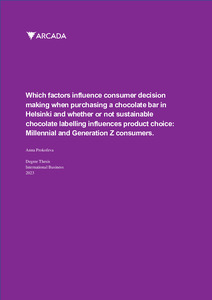Which factors influence consumer decision making when purchasing a chocolate bar in Helsinki and whether or not sustainable chocolate labelling influences product choice: Millennial and Generation Z consumers.
Prokofeva, Anna (2023)
Prokofeva, Anna
2023
All rights reserved. This publication is copyrighted. You may download, display and print it for Your own personal use. Commercial use is prohibited.
Julkaisun pysyvä osoite on
https://urn.fi/URN:NBN:fi:amk-2023121838174
https://urn.fi/URN:NBN:fi:amk-2023121838174
Tiivistelmä
Sustainable chocolate labelling aims to help consumers make organic and fair choices. This study examines the impact of various factors on the decision making of Gen Z and Millennial consumers, including sustainable labelling. The study reveals the most important factors influencing the choice of a chocolate bar. In addition, understanding and trusting sustainable labelling is the question of this study, as lack of awareness may prevent the label from influencing product selection.
The behaviour of chocolate consumers in Helsinki was studied using a qualitative research method. The researcher conducted five individual in-depth interviews with Gen Z respondents and five interviews with Millennial respondents. In the first part of the interview, questions were asked about the importance of factors for respondents. Then they were shown photographs of chocolate bars and asked to choose several of them, justifying their decision. The researcher saw what factors guide respondents when choosing chocolate bars. The last part of the interview was about sustainable chocolate labelling - understanding and trusting this labelling. All interviews were conducted in November 2023. The data was then analysed using thematic analysis.
The results show that the main factors when choosing chocolate among respondents of two generations are taste, brand and packaging design. The impact of sustainable chocolate labelling was found to be insignificant. Respondents paid least attention to the Rainforest Alliance label. Understanding of it also turned out to be the worst. In general, the majority of respondents indicated that sustainable labelling is insufficiently informative, which reduces their interest in purchasing the corresponding chocolate. When involvement is low, other factors often outweigh product selection. Gen Z respondents’ understanding of and trust in labels turned out to be slightly better than millennials’. The study's findings can help marketers understand how to increase consumer awareness and interest in sustainable product labelling.
Limitations of this study include the small sample size, the specific product category, and demographic and geographic factors. The study could be further developed by adding questions
that explore consumers' motivations for choosing sustainable chocolate and the factors that hinder this choice. Study could also be focused on the Rainforest Alliance label.
The behaviour of chocolate consumers in Helsinki was studied using a qualitative research method. The researcher conducted five individual in-depth interviews with Gen Z respondents and five interviews with Millennial respondents. In the first part of the interview, questions were asked about the importance of factors for respondents. Then they were shown photographs of chocolate bars and asked to choose several of them, justifying their decision. The researcher saw what factors guide respondents when choosing chocolate bars. The last part of the interview was about sustainable chocolate labelling - understanding and trusting this labelling. All interviews were conducted in November 2023. The data was then analysed using thematic analysis.
The results show that the main factors when choosing chocolate among respondents of two generations are taste, brand and packaging design. The impact of sustainable chocolate labelling was found to be insignificant. Respondents paid least attention to the Rainforest Alliance label. Understanding of it also turned out to be the worst. In general, the majority of respondents indicated that sustainable labelling is insufficiently informative, which reduces their interest in purchasing the corresponding chocolate. When involvement is low, other factors often outweigh product selection. Gen Z respondents’ understanding of and trust in labels turned out to be slightly better than millennials’. The study's findings can help marketers understand how to increase consumer awareness and interest in sustainable product labelling.
Limitations of this study include the small sample size, the specific product category, and demographic and geographic factors. The study could be further developed by adding questions
that explore consumers' motivations for choosing sustainable chocolate and the factors that hinder this choice. Study could also be focused on the Rainforest Alliance label.
